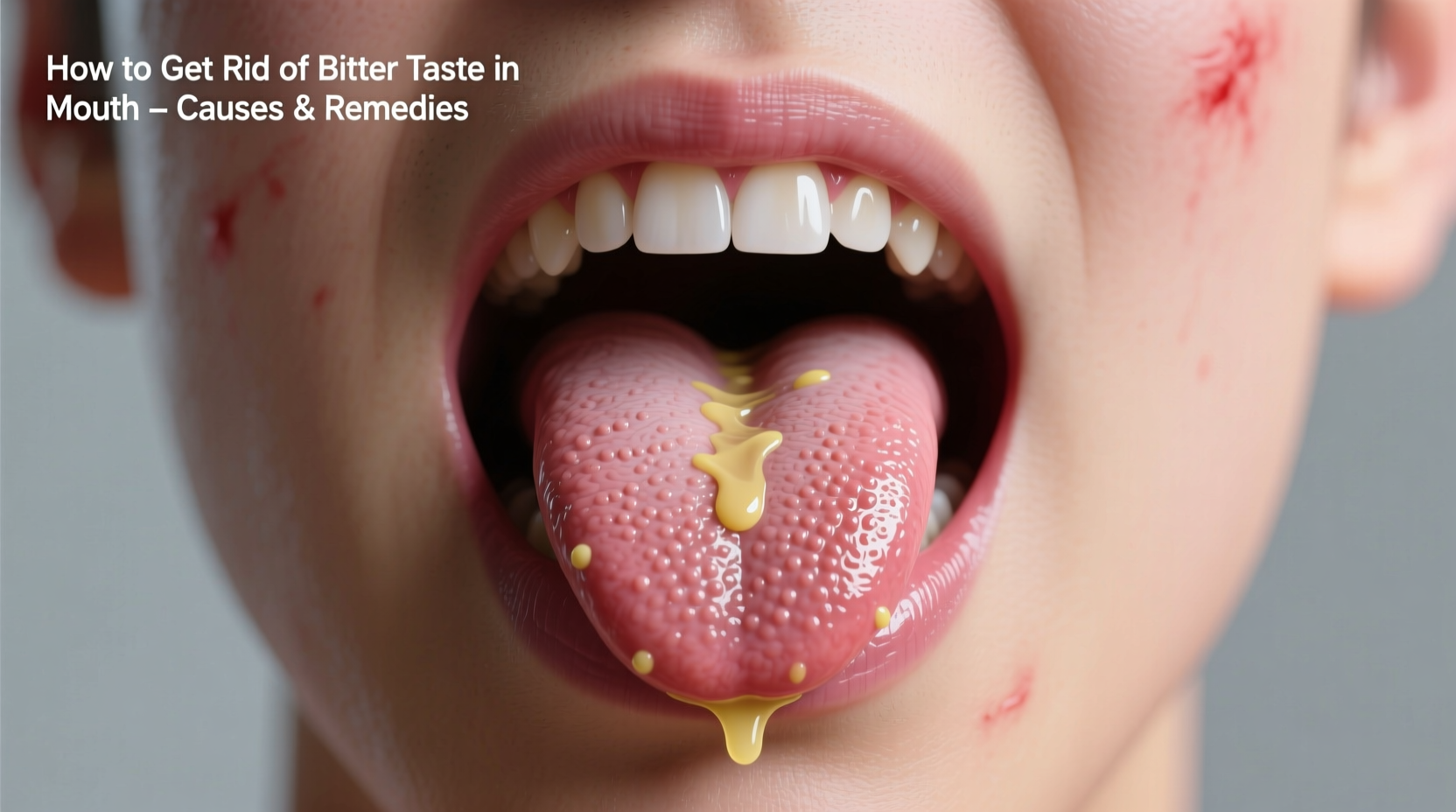If you're experiencing a bitter taste in your mouth, the most immediate solutions include drinking water to rinse your palate, practicing good oral hygiene, and avoiding trigger foods like coffee or acidic beverages. Most temporary bitter tastes resolve within hours with simple remedies, but persistent symptoms lasting more than 2-3 days warrant medical consultation to identify underlying causes like GERD, medication side effects, or oral health issues.
That unpleasant bitter sensation disrupting your meals and leaving you wondering why everything suddenly tastes off? You're not alone. Nearly 23% of adults experience taste disturbances at some point, with bitter taste being one of the most common complaints according to National Institute on Deafness and Other Communication Disorders research. The good news: most cases have straightforward solutions you can implement immediately.
Why Bitter Taste Happens: Understanding the Root Causes
Before diving into solutions, it's crucial to identify why that bitter taste appeared. Your taste buds don't lie—they're signaling something's amiss in your body. Common triggers include:
- Acid reflux (GERD): Stomach acid traveling up your esophagus brings bitter digestive fluids into your mouth
- Medication side effects: Antibiotics, blood pressure medications, and antidepressants frequently alter taste perception
- Poor oral hygiene: Bacteria buildup from inadequate brushing creates bitter compounds
- Dry mouth: Reduced saliva fails to wash away bitter compounds naturally
- Pregnancy hormones: Especially common in first trimester due to hormonal shifts
| Cause | Duration | Immediate Remedies | When to See Doctor |
|---|---|---|---|
| Acid Reflux | Minutes to hours after eating | Chew sugar-free gum, avoid lying down after meals | Persistent heartburn or difficulty swallowing |
| Medication Side Effects | Throughout medication course | Rinse with baking soda solution, stay hydrated | Before changing any medication regimen |
| Oral Health Issues | Constant or worsening | Brush tongue, use alcohol-free mouthwash | Bleeding gums or visible sores |
| Dehydration | Resolves with hydration | Drink 8oz water immediately | Dark urine or dizziness persists |
Immediate Relief: What to Do Right Now
When that bitter taste strikes, these evidence-based actions provide the fastest relief. The Mayo Clinic confirms these approaches effectively reset your taste perception:
Hydration Reset (First 5 Minutes)
Grab a glass of room-temperature water—not ice cold. Extreme temperatures dull taste receptors. Swish for 30 seconds then swallow. Repeat twice. This simple action washes away bitter compounds while stimulating saliva production. For enhanced results, add a pinch of baking soda to neutralize acid.
Tongue Cleansing Protocol (Next 10 Minutes)
Your tongue harbors bacteria that create bitter compounds. Follow this professional dental hygienist technique:
- Use a soft-bristled toothbrush or tongue scraper
- Gently brush from back to front 5 times
- Rinse with alcohol-free mouthwash containing xylitol
- Repeat after 30 minutes if taste persists

Longer-Term Solutions for Persistent Bitter Taste
If your bitter taste lasts more than 48 hours, implement these science-backed strategies. The American Dental Association emphasizes that chronic bitter taste often relates to underlying oral health conditions requiring consistent management.
Dietary Adjustments That Actually Work
Not all foods affect taste perception equally. Research shows these specific dietary changes produce measurable improvements:
- Citrus stimulation: Squeeze fresh lemon into water—citric acid resets taste receptors
- Zinc-rich foods: Pumpkin seeds and oysters support taste bud regeneration
- Avoid coffee and alcohol: Both dry mouth and leave bitter compounds
- Cold foods first: Start meals with chilled pineapple or cucumber to reset palate
When Home Remedies Aren't Enough: Medical Considerations
Understanding when to seek professional help prevents complications. Follow this evidence-based timeline:
- 0-24 hours: Try hydration and oral hygiene solutions
- 24-48 hours: Implement dietary changes and monitor symptoms
- 48-72 hours: Consult pharmacist about medication side effects
- 72+ hours: Schedule doctor visit to rule out GERD or infection
Medical professionals typically investigate these potential underlying conditions:
- Gastroesophageal reflux disease (GERD)
- Sinus infections draining into throat
- Oral thrush or other fungal infections
- Medication interactions
- Early signs of liver or kidney issues
Preventing Future Episodes
Proactive measures significantly reduce recurrence. Incorporate these habits into your daily routine:
- Morning routine: Brush tongue before coffee
- Post-meal ritual: Rinse with baking soda solution after acidic foods
- Nighttime protocol: Elevate head 6-8 inches while sleeping to prevent acid reflux
- Hydration strategy: Sip water throughout day rather than large amounts at once
Remember that persistent bitter taste lasting more than three days requires medical evaluation. While most cases stem from temporary issues like acid reflux or medication side effects, prolonged symptoms could indicate conditions needing professional treatment.











 浙公网安备
33010002000092号
浙公网安备
33010002000092号 浙B2-20120091-4
浙B2-20120091-4